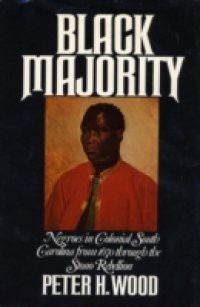African slaves, if taken together, were the largest single group of non-English-speaking migrants to enter the North American colonies in the pre-Revolutionary era. . . . And yet . . . most Americans would find it hard to conceive that the population of one of the thirteen original colonies was well over half black at the time the nation's independence was declared. In this first book to focus so directly upon the earliest Negro inhabitants of the deep South, Peter Wood brilliantly lays to rest the notion that the Afro-American past is unrecoverable and makes it clear that blacks played a significant and often determinative part in early American history. Using a wide variety of source materials, Mr. Wood brings to life the experiences of the black majority in colonial South Carolina. He demonstrates that the role of these early southerners was active, not passive: that their familiarity with rice culture made them an attractive, skilled labor force; that the sickle-cell trait may have been a positive influence in the warding-off of malaria, while a variety of acquired immunities served as protection from other diseases; that their African experiences enabled them to cope, often more effectively than Europeans, with the demands of the New World. He draws attention to Negro involvement in the early frontier, the roots of black English, the scale of black migration, and the plight of slaves who chose to run away. Tracing the worsening of conditions for the black majority as the colony expanded, Mr. Wood shows how tensions between the races grew and how black resistance evolved into calculated acts of rebellion. The most significant of these uprisings occurred near the Stono River in 1739 and rivaled, in its immediate ferocity and long-range implications, the revolt led by Nat Turner in Virginia almost one hundred years later. Until now the story of the Stono Rebellion has never been fully pieced together, and Mr. Wood reveals how the quelling of this uprising represented a turning point for the turbulent first phase of Negro enslavement in the deep South. Beyond its impressive scholarship and the intrinsic interest of its material, Black Majority performs an important service by recoveringand bringing into the American consciousnessa portion of the American past and heritage that has hitherto remained unknown.

